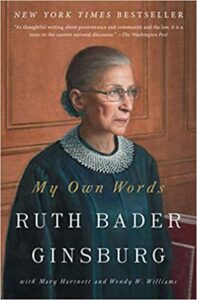Ruth’s Laws
“We are at last beginning to relegate to the history books the idea of the token woman,” Ruth Ginsburg said.
“Feminism [is the] notion that we should each be free to develop our own talents and not be held back by man made barriers,” Ginsburg said in her 2016 book “My Own Words.”
“Fight for the things that you care about, but do it in a way that will lead others to join you.”
1. Employers cannot discriminate against employees based on gender or reproductive choices.
ACLU Women’s Rights Project attorney Susan Deller Ross and Ginsburg pushed to have pregnancy discrimination recognized as a form of sex discrimination, according to the ACLU. The pair is credited for helping pass the Pregnancy Discrimination Act, an amendment to Title VII in 1978 which acknowledges pregnancy discrimination as unlawful. Women are now more protected against getting fired, or not considered for a job because they are pregnant or have plans to get pregnant.
2. State-funded schools must admit women.
In 1996, Ginsburg led the ruling decision in the United States v. Virginia case. Until then, women had been prohibited from attending the Virginia Military Institute. Ginsburg argued that rather than create a separate women’s program, they should be allowed to join the same program as men.
3. Women have the right to financial independence and equal benefits.
Ginsburg’s work paved the way for the Equal Credit Opportunity Act, which passed in1974 and allowed women to apply for bank accounts, credit cards, and mortgages without a male co-signer. She also helped ensure that women could receive the same military housing allowances as men, and women are no longer required to pay more for pension plans than men to receive the same benefits, according to the ACLU.
4. Men are entitled to the same caregiving and Social Security rights as women.
Throughout her career, Ginsburg stressed how gender equality benefits both men and women.
In 1968, Ginsburg represented Charles Moritz, a man who had never been married and claimed a tax deduction for caring for his mother, according to Smithsonian Magazine. The Internal Revenue Service (IRS) denied his deduction because he was a man and unmarried. The US Court of Appeals for the Tenth Circuit ruled that the IRS had violated the Equal Protection Clause of the US Constitution and in 1971 Section 214 of the IRS Code was amended to allow individuals to claim caregiving deductions, regardless of sex.
5. Juries must include women.
Up until 1979, jury duty was considered optional for women in the US. Several states argued that women should be exempt from participating due to family and household obligations. Ginsburg fought to require women to serve on juries on the basis that their civic duty should be valued the same as men’s.
“Women belong in all places where decisions are being made,” Ginsburg told USA Today in 2009. “It shouldn’t be that women are the exception.”
“I think part of what I find most inspiring about RBJ’s approach to social change was that it was so action-oriented even on a heady bench, it was exacting and unromantic. She wasn’t flying. She was plodding. She wasn’t grandiose. She was granular. I know we need all kinds of leadership to make this country different, but right now, in this moment of such urgency, I find her style–or lack thereof, really–refreshing. Her legacy is speaking to me like this: Keep your feet on the ground. Keep walking very deliberately and strategically, but for God’s sake, don’t fly to nowhere. Don’t fall in love with your own notions. Do the work. Do the hard things. Do them til you die.”
-Activist and author Courtney Martin
9.23.20
Chief Justice John Roberts on Ginsburg:
“Ruth used to ask: What is the difference between a bookkeeper in Brooklyn and a Supreme Court justice?”
“Her answer: one generation.”




Leave a Reply